Based on transcriptions of telephone conversations that Pavol Liska conducted with collaborator Kristin Worrall, the Nature Theater of Oklahoma has created a marathon musical worthy of the word epic. „Life and Times – Episode 1„ derives from the first conversation Pavol Liska had with Kristin Worrall, wherein Kristin makes the first attempt to tell her life story; spanning from her birth until her eighth year.
I sat down with founders Kelly Copper and Pavol Liska to talk about epic theater, boredom, conceptual writing and the Super Bowl.
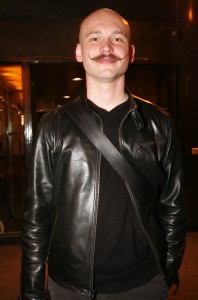
Pavol Liska. Photo: Kim Keibel
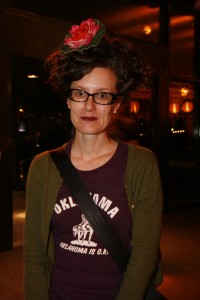
Kelly Copper. Photo: Kim Keibel
Shane Anderson: You’ve suggested that each production begins with a problem. What was the problem you decided to examine in „Life and Times“?
Pavol Liska: The number one problem was to further formalize the type of language we used in „No Dice“, „Romeo and Juliet“ and „Rambo Solo“. In „No Dice“, for instance, we used modes of speaking, various accents and ways of articulation. In „Life and Times” we asked ourselves: what’s the furthest we could go? We felt like the next and final step in this process was to sing the text.
Shane: Why did you choose Kristin?
Pavol: What I love about Kristin is the way she speaks and her ability to generalize simple stories. She can mark on a timeline of her life, these moments in life that are touchdowns for almost everybody like the first time she encountered cruelty. We didn’t want the audience to be watching an amazing life on stage. We wanted the audience to think about their own lives. If Kristin had been abused by her father or had had sex with her brother, the audience would have been allowed to sit back and judge aesthetically the story. They would have been able to consume the story. We’re not interested in that. We’re not looking for uniqueness and original stories but that which connects us. It’s not like „Romeo and Juliet“ needed to be told another time.
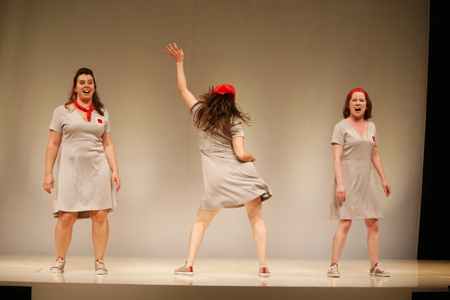
Just any old story. Photo: Kim Keibel
Shane: In the Burgtheater program, there’s a text that reads: „Epic stories seek epic forms.” How should we understand this? In terms of Greek Antiquity, Brecht’s epic theater or the American vernacular: „whoa, dude, that’s totally epic?“
Pavol: It’s more related to Homer or even One Thousand and One Nights.
Kelly: Or even a spectacular form. We’re looking for more spectacular ceremonies like the Super Bowl or the Macy’s Day Parade. The impossible task of „Life and Times” was to find an epic form. To have somebody spend the time it takes to tell a life story over 16 hours of phone conversations, you realize you have a dramatic arc that’s entirely different from the traditional one, which „Rambo Solo” and „Romeo and Juliet” mimicked. A life story has so many beginnings and so many endings.
Shane: You often work with constraints, as do members of Oulipo and conceptual writing. For Christian Bök, when he was writing Eunoia, it was a real revelation to be working within certain boundaries. What possibilites arise out of constraints? And have you ever found constraints to be too asphyxiating?
Pavol: I think we try to embrace every restriction. We look for them and we welcome them. I always look for the restriction, just like the members of Oulipo. Constraints produce an explosion. Our actors are well-trained and virtuosic and we want them to look for things they don’t know how to do, just like we’re looking for things we don’t know how to do. I can direct a Chekov or a Shakespeare but I’m not interested in doing what I know how to do.
Kelly: It’s usually been productive, even for the actors. For them, the restriction has been the singing. There’s such a narrow band [of expression] and that’s singing, singing, singing.
Pavol: But that makes them fight harder for freedom. The restrictions imitate the model of the world we live in, where we’re extremely restricted. I’m not free. I don’t ever feel free. And so I don’t really want to feel free in rehearsal or performance. I want to fight for my freedom. I want to learn how to live. And so by creating these extreme restrictions, maybe if I learn how to deal with these, then maybe I can translate them into my life. Can I find freedom in my life and on the stage?
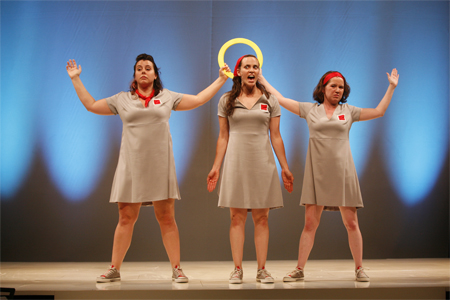
Singing Restriction. Photo: Kim Keibel
Shane: How is boredom something positive, if at all?
Pavol: I love boredom. I make the best stuff when I’m bored. Boredom is when you find yourself owning time; when it isn’t filled with other people or by the mask you put on your life. John Cage said, if it’s boring for two minutes, try it for four, and if it’s boring for four, try it for eight, and if it’s boring for eight, try it for sixteen. Something will transform, something will change if you’re not afraid of it. Obviously in our culture, and I’m speaking about myself too, it’s extremely difficult to allow yourself to be bored.
Kelly: Things are entertaining all the time. When we talk to the actors, we ask them to try and not give so much that there’s nothing they can take back from the audience. If you do too much for the audience, then there’s no room for them to think or imagine or create.
Pavol: If I keep giving you ice cream after ice cream, even if you love ice cream, you start wondering ‘why am I eating so much? I should eat vegetables.’ We want people to eat more vegetables.
Shane: In an interview, Kelly, you mention the difference between American and European art. Do you feel like you’re making one or the other? Some sort of hybrid? And what’s the difference of reception from one side of the pond to the other?
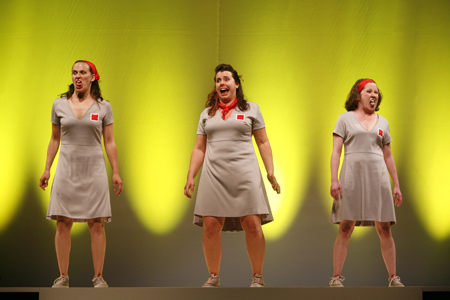
Fluid Differences. Photo: Kim Keibel
Kelly: We were talking about this the other day in Vienna where there are these giant edifices of art, with its swirling architecture. And here, in Europe, there is art, there’s junk art, like reality TV, and then there’s daily life, and none of them intersect. And so you have all these Europeans that came to America, like Duchamp and Warhol, who were the ones examining the boundaries between these things. I feel like American art offers a continuum between high art, junk art and daily life. The boundaries are porous. Overlapping. It’s much more fluid. That would be the tangible difference for me.
Pavol: We just love bad television. We haven’t encountered that in Europe, they don’t watch enough television.
Kelly: And they would never admit it if they did.
Pavol: I love reality TV. The worse the television is, the better. To me a reality TV show like Survivor is no different than Faust. I don’t make any qualitative differences –
Kelly: Or Survivor and Faust are in dialogue –
Pavol: They are talking to each other in a more inclusive way than I think they do in Europe. That’s the big difference, from my perspective.
Kelly: In America theater isn’t accorded an important place, whereas here it’s a given. And this was the biggest ideological difference between our actors and the guys from Burgtheater, when we started to work with them. They really feel deep in their hearts that what they’re doing is important and worthy and should be celebrated, that it should be attended. Whereas I think we doubt that what we’re doing is important. I know that being a doctor or feeding the world is much more important. This is of dubious significance. But that’s why I fight all the harder. I have to fight more to know why it’s important, to know why I do it.
To see the full interview, please visit here.